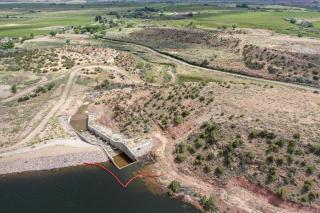Utah first state to benefit from transfer of federal water projects to local control under Dingell Act

SALT LAKE CITY — Two federal watershed projects are expected to be turned over to Utah in a first-of-its-kind transfer from federal oversight to local control, a move hailed as a win-win by local and federal officials.
The transfer of the Emery County and the Uintah Basin Replacement Projects are the first federal water management programs to be transitioned to local management under a 2019 natural resources bill, the U.S. Department of the Interior announced Tuesday.
The law, called the Dingell Act, is a natural resource management bill which received bipartisan support in Congress last year. It allows the Department of the Interior to approve the transfers of federal natural resources projects without an additional act of Congress.
“These title transfers fulfill President Trump’s goals to streamline bureaucratic processes, empower local ownership and facilitate infrastructure investment and job growth,” Interior Secretary David L. Bernhardt said in a written statement.
With project titles in hand, each of the water districts will have the autonomy to manage its own water resources, and the federal government can remove the projects from its management and oversight budget. The Interior’s Bureau of Reclamation — which currently manages the projects — has a maintenance and enhancement backlog approaching $4 billion dollars, Utah Congressman Rob Bishop said. Bishop is the ranking Republican on the House Committee of Natural Resources.
Tuesday’s announcement marked the formal start of the streamlined 90-day congressional review period. Lawmakers did not expect the transfer to be disputed.
Renewed ownership of the watershed “gives us back some equity in our land,” said Dex Winterton, Moon Lakes Water Users Association general manger. The transfer will allow local users to manage how the water is used, he said.
The Emery County Project — which will be transferred to the Emery County Water Conservancy — includes the Joes Valley and Huntington North Dam and Reservoir, Swasey Diversion Dam, Cottonwood Creek-Huntington Canal, Huntington North Service and Feeder canals and evacuation pipeline, the Upper Lakes Reservoir and more than 1,100 acres of federal land in east-central Utah.
The Emery County Water Conservancy District will take ownership of the project, said conservancy manager Jay Humphrey. The water district has already been caring for the project for more than 50 years, he said.
Nearly 1,000 acres of federal property in northeast Utah will soon belong to the Moon Lake Water Users Association. The second water project — the Uintah Basin Replacement Project — includes the Big Sand Wash Feeder Diversion and Pipeline, Big Sand Wash Reservoir and Big Sand Wash Roosevelt Pipeline.
The Dingell Act received near unanimous support from Utah’s congressional delegation last year, with Sen. Mike Lee as the only Utahn voting against the bill. The law sailed through Congress, passing 92-8 in the Senate and 363-62 in the House. Sen. Mitt Romney was one of 15 Senate co-sponsors of the bill.
Romney said Tuesday he was “proud to lead efforts in the Senate to get the Dingell Act across the finish line.”
“With these transfers, the Emery County and Moon Lake water districts now have the autonomy to manage their own water resources — which is great news for Emery County and the Uintah Basin. We need more of this kind of local control, and I will continue pushing to return the decision making and management of our natural resources to the Utahns who are closest to them,” Romney said.
Conn Carroll, a spokesman for Lee, said the senator’s opposition to the new law was because it was “a huge 660 page bill” which touched on “many different public lands issues, and on balance Sen. Lee thought it did not merit his support.” Nevertheless, Lee and the rest of the Utah delegation were praised by district water managers for their efforts to shepherd the projects from the federal government to local control.
“I voted to support the Dingell Act largely because I knew it would be a win for Emery County residents and Utahns,” said Rep. John Curtis, because of the local agreement incorporated within the bill. The law’s ability to quickly transfer resources and ensuring Utahns can still recreate in the watersheds was also important, he added.
Bishop said the two Utah water projects were the first to be transferred as part of the Dingell Act because they’d already been in the legislative process for years. He was hopeful that returning the projects to the local water districts would be an example of what can be done for other projects in the future.
“If you know me, I’ve always objected to Congress giving up authority to the executive branch,” Bishop said in an interview, but he said this was a logical way to allow the Interior to act quickly to benefit people.
“If we don’t do this transfer, no one wins. If we do this transfer, we all win,” said the congressman.

